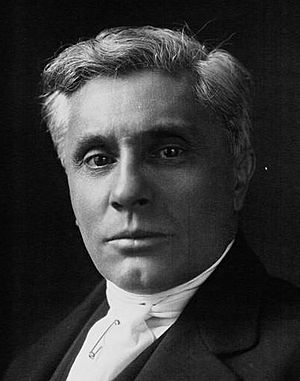Joseph Paul-Boncour facts for kids
Quick facts for kids
Joseph Paul-Boncour
|
|
|---|---|
 |
|
| Prime Minister of France | |
| In office 18 December 1932 – 31 January 1933 |
|
| President | Albert Lebrun |
| Preceded by | Édouard Herriot |
| Succeeded by | Édouard Daladier |
| Personal details | |
| Born | 4 August 1873 Saint-Aignan, Loir-et-Cher, France |
| Died | 28 March 1972 (aged 98) Paris, France |
| Political party | PRS |
| Occupation | Lawyer |
Joseph Paul-Boncour (born August 4, 1873 – died March 28, 1972) was an important French politician and diplomat. He was active during a period in France called the Third Republic. He was a member of the Republican-Socialist Party and even served as the Prime Minister of France for a short time. This was from December 1932 to January 1933.
Paul-Boncour also held many other government jobs in the 1930s. He was a special representative for France at the League of Nations in 1936. The League of Nations was an early international organization. It aimed to keep peace around the world.
Contents
Early Life and Start in Politics
Joseph Paul-Boncour was born in a town called Saint-Aignan, Loir-et-Cher, in France. He studied law at the University of Paris. After finishing his studies, he became involved in the labor movement. This movement worked to improve conditions for workers. He helped organize legal advice for workers' groups.
From 1898 to 1902, he worked as a private secretary for the Premier, Pierre Waldeck-Rousseau. A Premier is like a prime minister. In 1909, Paul-Boncour was elected to the Chamber of Deputies. This was a part of the French parliament. He was a member of the Radical Party at that time. He kept his seat until 1914. During this period, he was also the Minister of Labour for a few months in 1911.
World War I and Changing Parties
Paul-Boncour served in the military during World War I. After the war, he returned to the French National Assembly. This is France's main law-making body.
He then became a Socialist and joined the SFIO in 1916. However, he left the Socialist Party in 1931. He believed France needed to strengthen its national defense. This was because the League of Nations seemed to be losing its power. The Socialists did not agree with him on this point.
After leaving the SFIO, he joined the Republican-Socialist Party (PRS). This party later joined with other socialist groups in 1935. They formed the Socialist Republican Union (USR). Also in 1931, Paul-Boncour was elected to the Senate. He served there until 1940. This was when the Vichy government was formed during World War II.
Important Government Roles
While he was a Senator, Paul-Boncour held many important jobs.
- He was the special representative for France at the League of Nations from 1932 to 1936.
- He was the Minister of War in 1932. This role is in charge of the country's military.
- He served as Premier (Prime Minister) from December 1932 to January 1933.
- He was also the Foreign Minister twice. First from December 1932 to January 1934, and then again from March to April 1938. This role deals with how France interacts with other countries.
After World War II
Paul-Boncour was against the Vichy government. This government worked with Nazi Germany during World War II. He wanted France to keep fighting against Germany from Algiers, a city in North Africa.
After the war, he became a member of the Consultative Assembly in 1944. He led the French team to the United Nations conference in San Francisco. There, he signed the United Nations Charter for France. This document created the United Nations, which works for peace and cooperation worldwide. He served as a Senator again from 1946 to 1948.
Joseph Paul-Boncour passed away in Paris on March 28, 1972. He was 98 years old.
See also
 In Spanish: Joseph Paul-Boncour para niños
In Spanish: Joseph Paul-Boncour para niños
 | Charles R. Drew |
 | Benjamin Banneker |
 | Jane C. Wright |
 | Roger Arliner Young |

